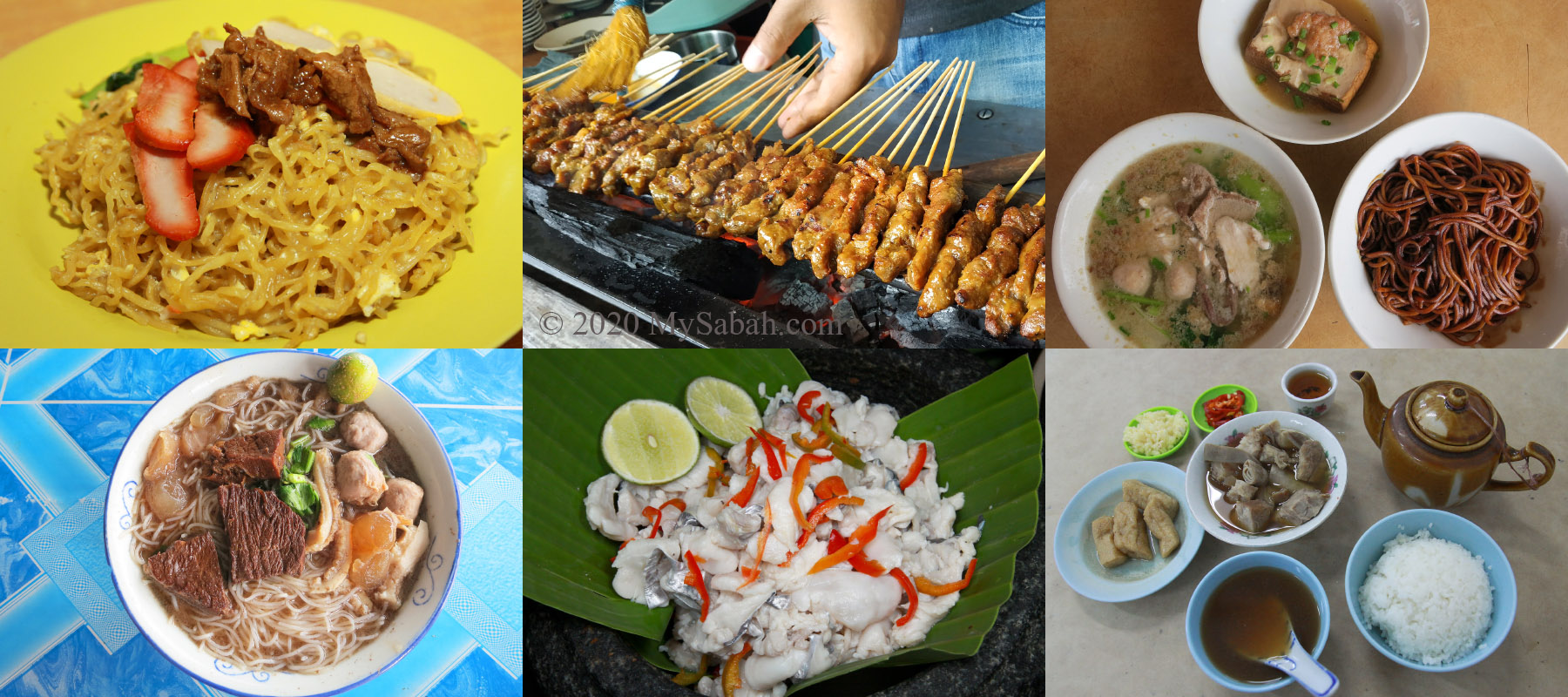Every year about 4 millions tourists visit Sabah because of her nature wonder, which is completed with islands & beaches, hills & mountains, pristine rainforest, abundant marine and Borneo wildlife, and colorful cultures, all suitable for a leisure vacation and softcore adventures. We have Sipadan Island, one of world’s top 5 dive sites, Danum Valley, a Borneo virgin rainforest older than Amazon and Mount Kinabalu, the highest mountain of Malaysia.
Where is Sabah?
Sabah is one of the 13 states of Malaysia, a country in the centre of South East Asia. Sabah is at the northern part of Borneo, the third largest island in the world, shared by three countries, namely, Malaysia (Sabah and Sarawak), Brunei, and Indonesia (Kalimantan). Sabah is the second largest state of Malaysia, and also a mountainous state with 59% of her land covered by forest.
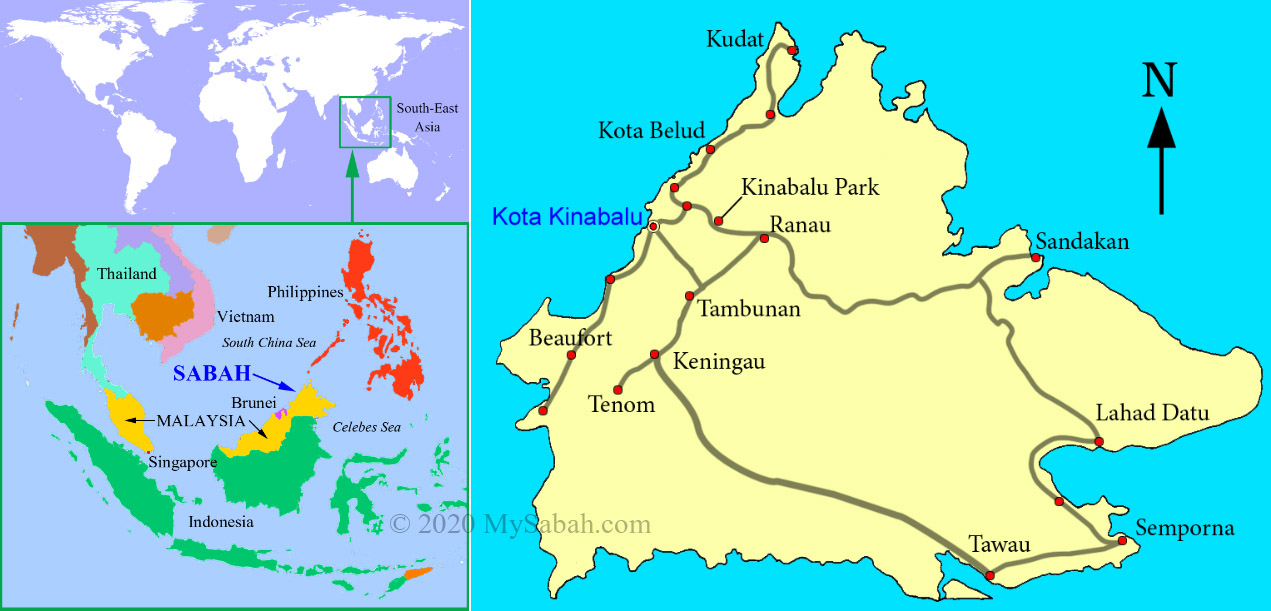
The capital of Sabah State is Kota Kinabalu city (KK in short). With a population of over 244,000, KK is located in west coast and the 13th largest city in Malaysia. Most tourists who visit Sabah will land in KK by air. KK is voted as one of the best cities for retirement in the world.
Time Zone
Sabah is 8 hours ahead of GMT (GMT+8), same time zone as Kuala Lumpur and Shanghai.
Climate
Malaysia is a tropical country with warm and humid climate (Humidity: 85-95%) throughout the year, so is Sabah, the temperatures are fairly constant, ranging from 32°C (90°F) in lowland to 21°C (70°F) in highland. Temperature can reach near freezing point in higher altitude of Mt. Kinabalu. The wettest months of Sabah are from December to January, with heavy rain from Northeast Monsoon. The dry months are from March to September. The most comfortable clothing are lightweight and quick-dry T-shirt, shorts and sandal. Only in highland such as Kundasang, Ranau, Tenom and Tambunan you would need more clothing like jacket to stay warm. To locals, our weather only has 3 modes: sunny, cloudy or rainy.
Natural Disasters
Sabah is also known as The Land below the Wind because we are just below Typhoon belt of Philippines and not hit by typhoon. However, the tail of typhoon would brings rainstorm (happens occasionally between Apr and Nov), strong wind and rough waves that affect outdoor activities. During heavy rain season, flood and landslide occurs in some areas. It’s advisable not to visit Kinabalu Park on the same day you leave Sabah, just in case the way home is blocked by landslide.
No Tsunami (tidal wave) threat presents in Sabah. There was a magnitude 6.0 earthquake in 2015, but no life-threatening earthquake thereafter. Week-long haze may or may not occur between Jun and Sep, the time neighbouring Kalimantan clear the land by open burning.
What’s the Best Time to Visit Sabah?
Actually anytime is fine. Due to global warming, the weather is not so predictable.
- Dry Months: March to September (ideal for outdoor activities)
- Diving: April to June (best visibility and calmest waters), February to March (whale shark season)
- Turtle Nesting: July to August
- Stargazing: April to September
Worst Months to visit:
- Chinese New Year (between late Jan and mid-Feb) and Puasa (Muslim fasting month), the time when many shops / restaurants are closed.
- Wet Months: Nov-Jan (Northeast Monsoon)
- Peak Season (Travel): Nov-Jan and Jun-Aug. Book flight and hotel earlier if you will visit Sabah in these months.
Events & Festivals
You won’t regret to add the following grand cultural events into your itinerary.
- 30 & 31 May: Kaamatan Celebration (Harvest Festival)
- April: Lepa-Lepa Water Festival*
- October: Tamu Besar*
*date is subject to change
Electricity
Electricity is on the 240 Volts AC/ 50-Cycle system. Malaysia uses standard British three-pin rectangular blade plug (Type G) and sockets. You can buy the travel universal plug in our shopping malls.
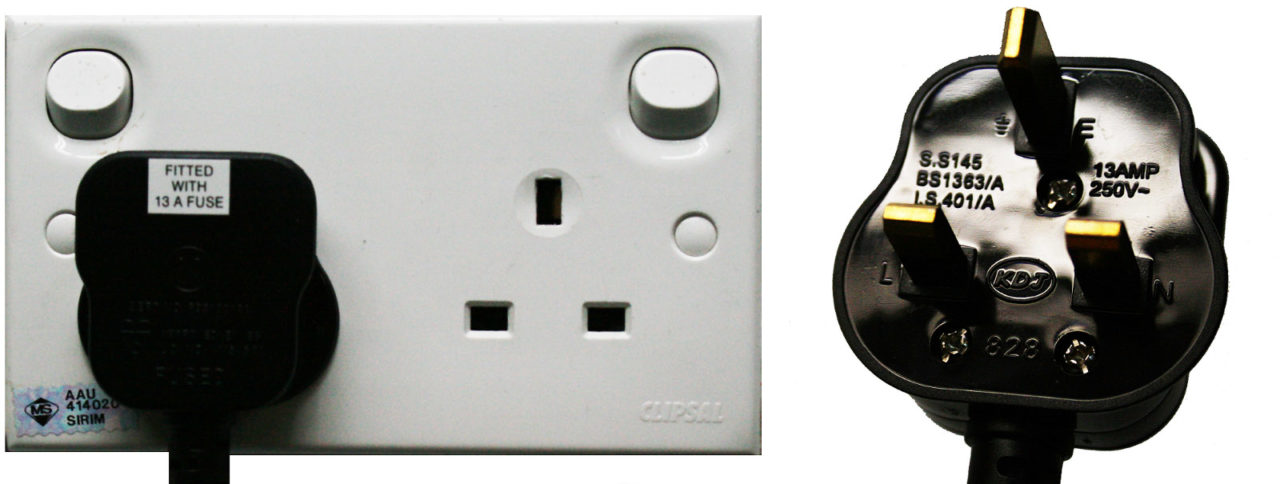
Units of Measurement
British Imperial System. We use Kilometre (KM), Metre (M) and Centimetre (CM) to measure distance and length, Kilogram (Kg) and Gram (G) for weight measurement.
Money and Payment
The international currency code of Malaysian Ringgit is MYR. But you see Ringgit is more commonly labelled as RM on price tags here. Both MYR and RM are the same thing (e.g. RM20 = MYR20). Banknotes are divided into the following denominations: 1, 5, 10, 20, 50 and 100.
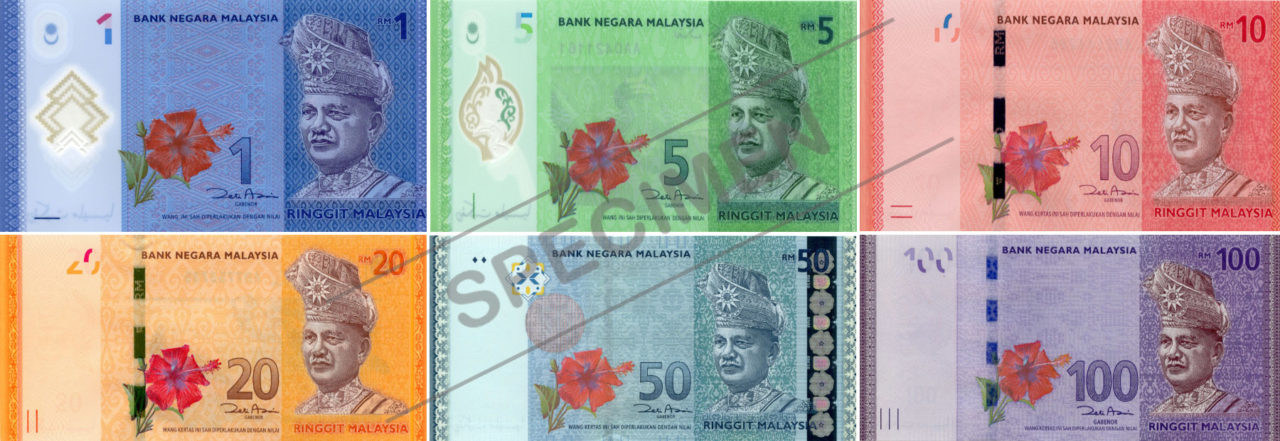
Cash is King, so always have at least one or two hundred Ringgit cash with you, though e-Wallet such as Boost is getting very popular. Small eatery, bus and national parks usually expect you to use cash. Credit Cards such as MasterCard and Visa are widely accepted by hotels, restaurants and larger shops. Some shops may require you to spend a minimum amount of money like MYR30 or MYR50 to allow payment by credit card.
Currency Exchange
Kota Kinabalu International Airport has a few money changers where you can exchange your currency to Ringgit. You may exchange a small amount of money, then convert the rest with Licensed Money Changers in the shopping malls, which offers better rate. Most major hotels charge a nominal fee for currency conversion. You can use the form below to check the latest exchange rate of your currency to Malaysian Ringgit (MYR).
There are a lot of licensed money changers in shopping malls of city. Make sure your notes are in near-perfect condition as notes with any torn or stains would not be accepted by money changers. Commonly accepted currencies are US Dollar, Australian Dollar, British Pound, China RMB, Indonesia Rupiah, Philippines PESO, Thailand Baht, etc. You may convert your money to one of these currencies above in your country first to bring to Sabah. Be vigilant of people around you when you leave the counter with your money.
Internet WiFi & Phone
Sabah has 4G coverage in populated area. You can get a local SIM card and register a prepaid phone line (with Internet data plan) at Kota Kinabalu International Airport, if you arrive in normal working hours. Our big 3 cellphone service providers are Celcom, Maxis (HotLink), and Digi.
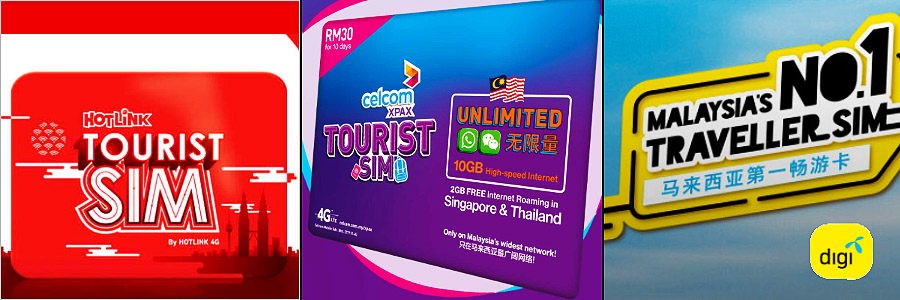
Maxis has great Internet speed in city and suburban areas. Celcom has the widest coverage but fairly slow line. Digi is somewhere in between. You and your travel mates can use different providers to backup each other. You can browse the Traveller SIM Cards by Celcom, Maxis, and Digi.
There are many phone shops in city that can help you to register a line or reload credit. By law you need a passport to register. The country code of Malaysia is 60. If you get a mobile phone number like 012-3456789. Your overseas friends and relatives can call you at +60123456789. Anyway, you can use Whatsapp and Facetime. Set your phone to airplane mode when you are in remote places that have no connection, or the busy network search would drain your battery.
WiFi service is available in most hotels (some may charge a fee). Many restaurants and cafes in town also have free WiFi access. Kota Kinabalu City centre has free WiFi but the connection is quite patchy (no every street is in the range).
Shopping
Travellers can buy almost every necessities in Sabah, so you can cut the weight of you check-in luggage. Shopping malls generally open daily from 10am to 9:30pm. They are air-conditioned and good place for grocery shopping, phone service, local food, money changers, clothing, and movie time. Toilet inside shopping mall collects an entry fee of MYR0.20 to MYR0.50. Besides shopping malls, you can find drug store / pharmacy, supermarkets, and 24×7 convenience stores around town area.
Things to Buy
Sabah Tea, Tenom Coffee, White Coffee, Orangutan / Proboscis Monkey plush toy, handicraft (bead necklace / bracelet, baskets), hand woven tapestries, colourful serdang box, Sabah batik, durian chocolate, mango candy, dried seafood, frozen seafood, scarf with Sabah motif, and sting-less bee honey are popular buy, besides the ordinary keychain, fridge magnet and I♥Sabah T-shirt. You may check out my guide on 10 best souvenirs to buy in Sabah.
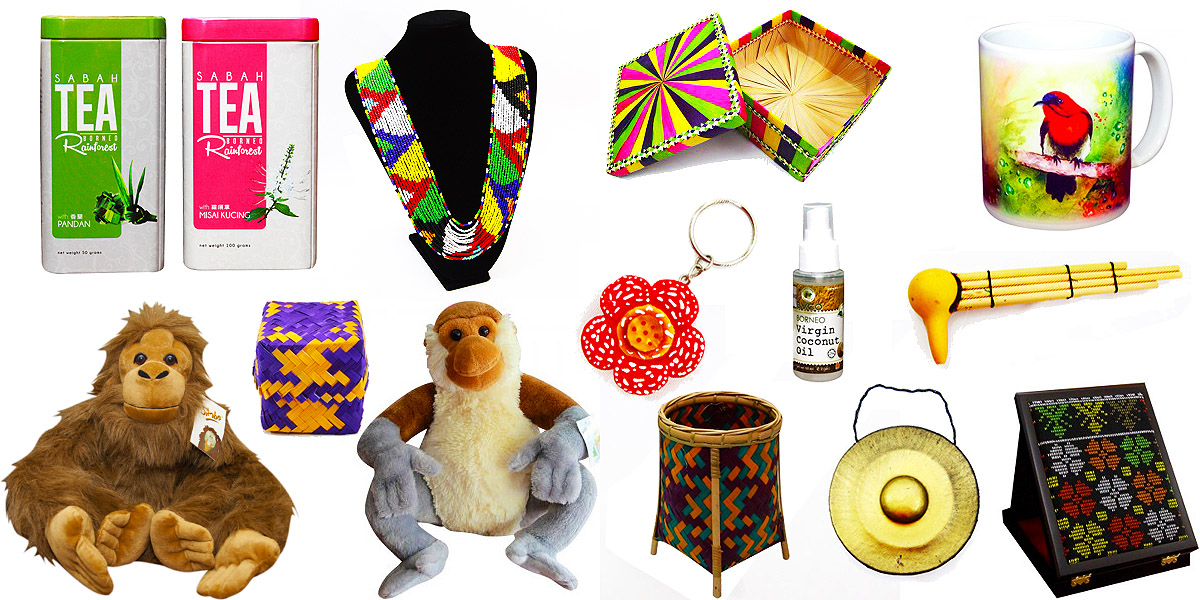
Good places to shop and bargain for these souvenirs are Gaya Street shoplot and its Sunday Market (7am-12pm) in KK City Centre. Filipino Market next to KK Central Market is also a good spot. KadaiKu has the best line of authentic Sabah products (higher prices).
Popular Tours
Most tourists travel in Sabah for 5 days and majority of them visit or do the following:
- Climbing Mount Kinabalu*: the highest mountain of Malaysia
- Kinabalu Park: staycation in the cooling highland and tour around the UNESCO World Heritage Site and Geopark
- Kinabatangan River (Corridor of Life): river cruise to see Orangutan, Proboscis Monkey and Pygmy Elephant
- Sepilok Orangutan Rehabilitation Centre Orphanage and “school” of baby orangutan
- Tunku Abdul Rahman Park: beautiful islands (e.g. Sapi, Manukan) 15 minutes away from KK
- Mantanani: Mermaid Island
- Mari-Mari Cultural Village: experience lifestyle of 5 native tribes
- River Cruise at Klias, Weston, Kawa-Kawa: Wetland, Sunset and Proboscis Monkey
- Poring Hot Springs: natural hot springs, tree canopy walk, rafflesia flower
- Tip of Borneo: scenic beach and seascape
- Islands of Semporna (part of Coral Triangle): Sipadan*, Mataking Island, Mabul Island, Bohey Dulang Island
- Padas / Kiulu River Rafting
- Danum Valley: 130-million-year old primary rainforest
- Turtle Islands Park (Selingan)*: turtle nesting and hatchery
*Need to book 6 months in advance as they are always fully booked, even in non-peak seasons.
Sabah has many more wonderful attractions, please explore them in this travel blog MySabah.com (shameless self-promotion). Not all destination accepts walk-in tourist, some requires you to go by tour.
People and Culture
There are 42 ethnic groups living in harmony in Sabah. In Sabah population of over 3.5 millions, Kadazandusun people are the largest indigenous group and occupy 30% of population, followed by Bajau (21%), Malay (20%) and Murut (5%). 12% of Sabah population is Chinese and most of them live in cities. Interracial marriage is very common, so don’t be surprised if a native can speak Chinese.
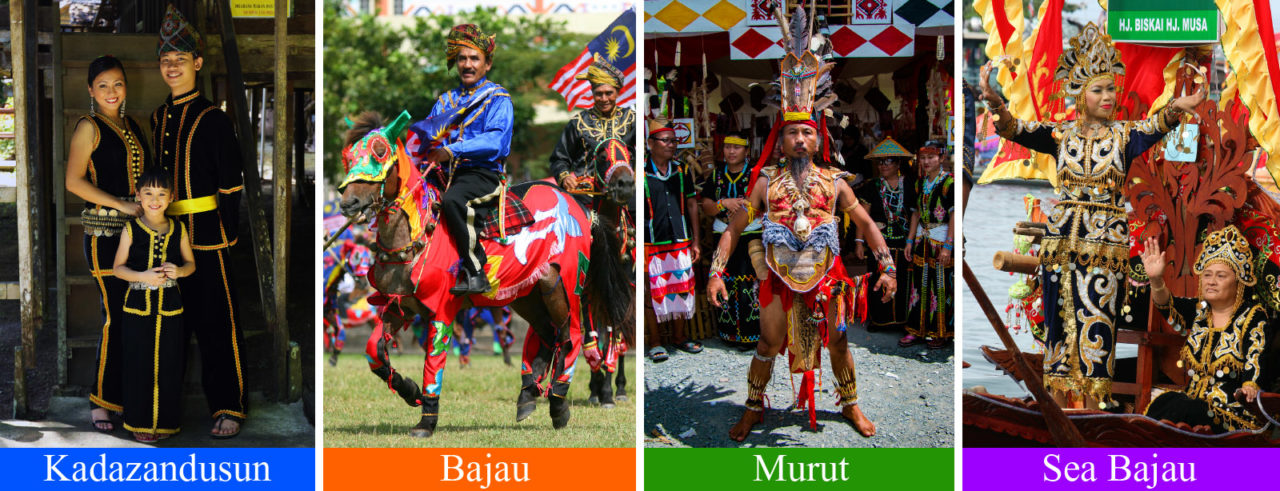
Generally, Sabah people are gentle, friendly and more tolerant. Though we are Malaysians, we like to call ourselves as Sabahans. Sabahans are very laid back, we might look like slow loris to those from fast-paced modern cities LOL.
Interesting Facts
- The iconic dance of Sabah is Sumazau of Kadazandusun people, which mimic the movement of bird in flight.
- Murut was once the headhunter of Borneo. Their bamboo dance (named Magunatip) is to welcome the return of headhunters.
- Bajau is the Cowboys of the East because of their excellent horse-riding skill.
- Sea Bajau in East Coast is also known as Sea Gypsies, sea nomads who spend their lives (cooking, giving birth, sleeping) on the boat.
- Most Sabah Chinese are the descendants of Chinese labours immigrated from China in 19th century. Hakka, Hokkien and Cantonese are the most common Chinese dialects.
Religion
Islam is the official religion of Malaysia and 65% of Sabah people are Muslim, followed by Catholics, Christians and Buddhists. Many destinations have Surau room for Muslim to pray. In hotel room, look for the Qibla compass on the ceiling that points to Makkah. Malaysia is rated as a top Muslim-friendly holiday destination, in terms of Islam-compliant on food, services, prayer facilities and accommodation.
Languages
About 80 languages are spoken in Sabah. Malay is the national language, English is our second language and widely spoken, especially in urban and business environment. English is used in shop signage and even food menu. Chinese is also common in cities. Tourists have very little language barrier in Sabah. Most Sabahans are multilingual and can converse in 2 or more languages such as Malay, English, Chinese (Mandarin), Hakka and Cantonese.
Yes we know English but… it’s not our mother tongue. If we have problem to understand you, you may need to speak slowly and clearly using simple words. Avoid using slang from your region.
Useful Phrases
Sabahans do understand basic English phrases such as “How are you?” and “Thank you.” You can travel comfortably in Sabah without learning any local words. The only reason you learn is for ice-breaking with your cute pronunciation. If you really want to impress the locals, say “Boleh Bah Kalau Kau” (meaning: Can / Sure if this is for you / Of Course!) or Bah (meaning OK or Yes).
Anyway, here are some useful words for you to read local signage:
Tandas (Toilet), Lelaki (Male), Perempuan (Female), Tutup (Closed), Jalan / Jln. (Road / Street), Kampung / Kg. (Village), Taman (Park), Masuk (Entrance), Keluar (Exit), Kedai (Shop), Bas (Bus), Teksi (Taxi), Air (Water).
Local Etiquette
Sabahans are really diversified. Even if one group accepts certain interaction, the same thing can be awkward to others. Don’t worry. Sabahans are highly-tolerant. But good to be respectful and sensitive.
- Take off your shoes before entering house, mosque and (some) temple.
- Don’t handshake with left hand. A handshake should only be initiated by ladies.
- In places of worship, visitors are required to dress modestly. Lady is required to wear scarf and long skirt to cover their hair and exposed skin in mosque.
- Muslim takes no pork & liquor, do not offer them.
- Pointing at people with index finger is rude, you may use your thumb to point at something (still better not pointing at any person).
- No nude / topless sunbathing on beach (I have no complaint but many think boobs are evil).
- Holding hand and hugging with your spouse in public is romantic. Long wet kiss is probably too much here.
- Guys, don’t touch the shoulder of female.
Just to list a few examples of misbehaved tourists: going nude on Mount Kinabalu and Sibuan, walking in city with bikini, hot dance at mosque. Sabah is not Miami.
Food and Dining
The staple food of Sabahans are rice, noodles and bread. As a multicultural and food loving society, we have many options to spoil you. The most common place locals going for a meal is Kopitiam or Kedai Kopi (Coffee Shop), an open air shop which sells common food items such as mixed rice (nasi campur), chicken rice and fried noodles. A proper meal costs about MYR6 to MYR8 (without drink) in city. Japanese food, Western food and fast food are common as well in city. Fun Fact: All small towns have KFC Fried Chicken.
Recommended Food
Tuaran Mee (Tuaran Fried Noodle), Ngiu Chap (Beef Noodle), Sang Yuk Mee (Pork Noodle), Tamparuli Mee, Fish Noodles, Seafood, Kon Lou Mee (Dry Noodle), Nasi Lemak, Bak Kut Teh, Satay, Laksa, Rojak, Soto (Malay Noodle Soup), and Hinava (Local Fish Salad).
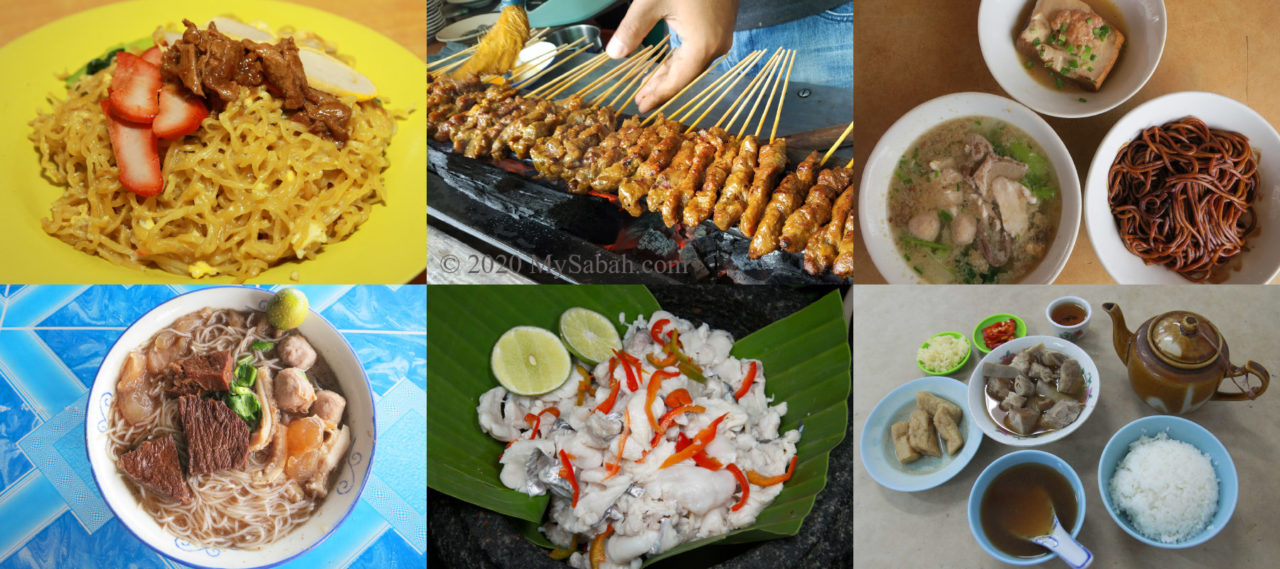
Dining Guide
If this is your first time visit Sabah, below are some guidelines:
- No smoking in any eatery.
- Some restaurants say they “Serve No Pork” but that doesn’t mean they are certified halal. Look for halal logo when in doubt.
- Most Sabah hotels are compliant with Halal.
- Malay and Indian Kopitiams serve Halal (Muslim) food. Non-Muslims are also welcome to eat there.
- You may see a small pot on table of Malay Kopitiam, the water is for washing hands. Don’t drink it.
- Some kopitiam are self-service. You need to get your utensils and condiment at one corner.
- Food spoils fairly quick in warm temperature of Malaysia. Don’t eat wet food that is left overnight in room temperature. You would suffer food poisoning.
- Although Malaysia is an Islamic country, Beer & liquor are sold in many shops but at higher price (due to tax). Or you can try our Tapai or Lihing (local rice wine)
- KFC and McDonald in Malaysia serve halal food. Don’t ask for pork burger.
- Tipping is not obligatory but appreciated. If you see 10% service charges on your bill, you have contributed some.
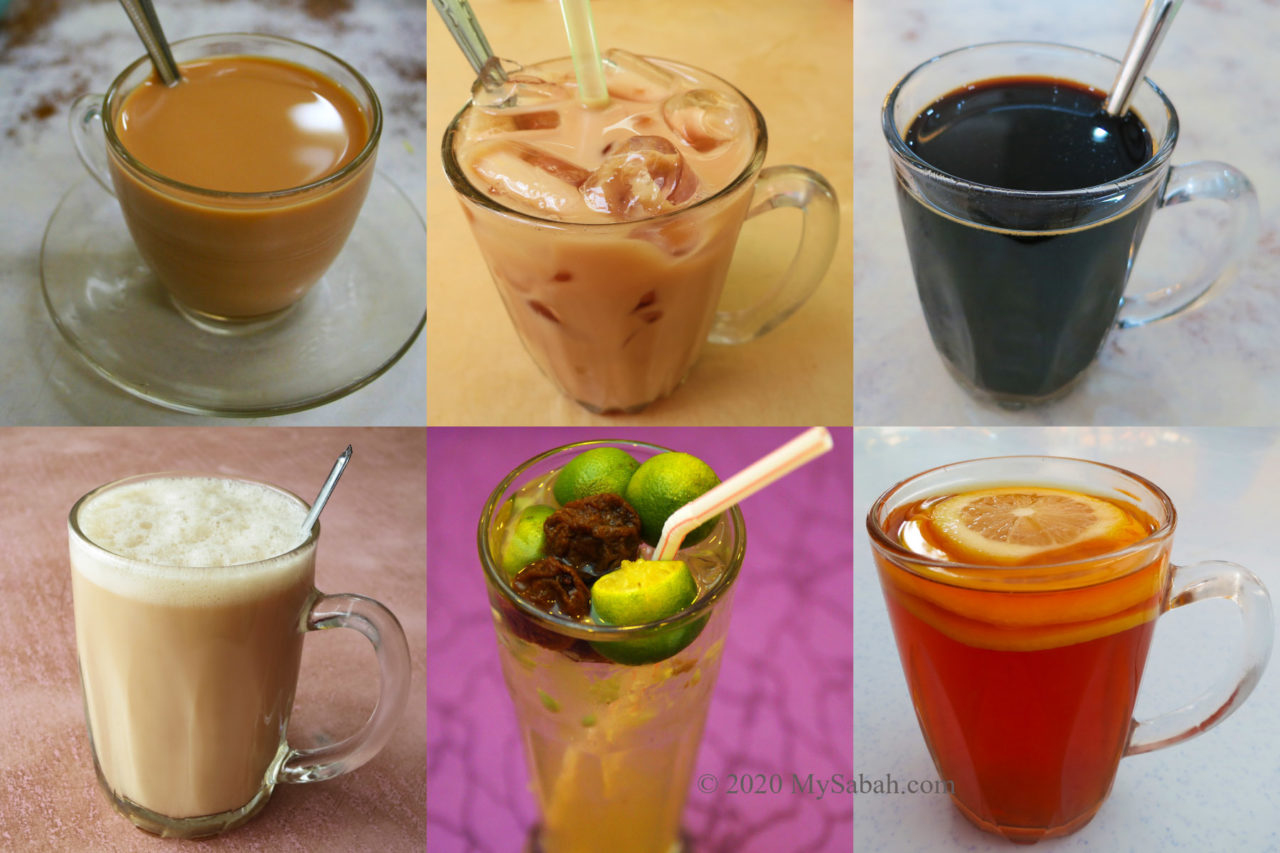
Feel free to order drink like a local with the following names:
- Kopi-O (Hot Coffee)
- Kopi-C (Hot Milk Coffee)
- Teh-C (Hot Milk Tea)
- Teh-O Ping (Ice Milk Tea)
- Kit Chai Ping (Iced Kasturi Juice)
- Teh Tarik (Pulled Tea)
(Kopi = Coffee, Teh = Tea, O = No Milk, C = Milk, Ping = Cold) So Ice Milk Tea is “Teh-C Ping”.
Entering Sabah
Malaysian citizens from Peninsular Malaysia can enter Sabah with MyKad (passport not required). Foreigner need a passport or Visa to visit Sabah. Your Passport must have a validity of at least 6 months upon entry. Visa is not required for some countries such as Australia, USA, UK and Japan. You can check if your nationality is Visa-free online.
If your country is eligible (e.g. China, India) to apply Visa (eVISA) online, you may submit your application here. You can request your travel agent to do it for you. In addition, all foreign travellers (except a few neighbouring countries of Malaysia) must complete the Malaysia Digital Arrival Card (MDAC) within three (3) days prior to their scheduled arrival in Malaysia.
Goods Exempted
Individual may bring these items into Malaysia without paying customs duty:
- Wine / spirit / malt / liquor not exceeding 1 Liter in all;
- Tobacco not exceeding 225 Grams (equal to 200 sticks of cigarettes).
- Wearing apparels not exceeding 3 pieces and footwear not exceeding one pair.
- Portable electrical or battery operated appliances for personal care and hygiene not exceeding 1 unit each.
- See the complete list in Royal Malaysian Customs Department website
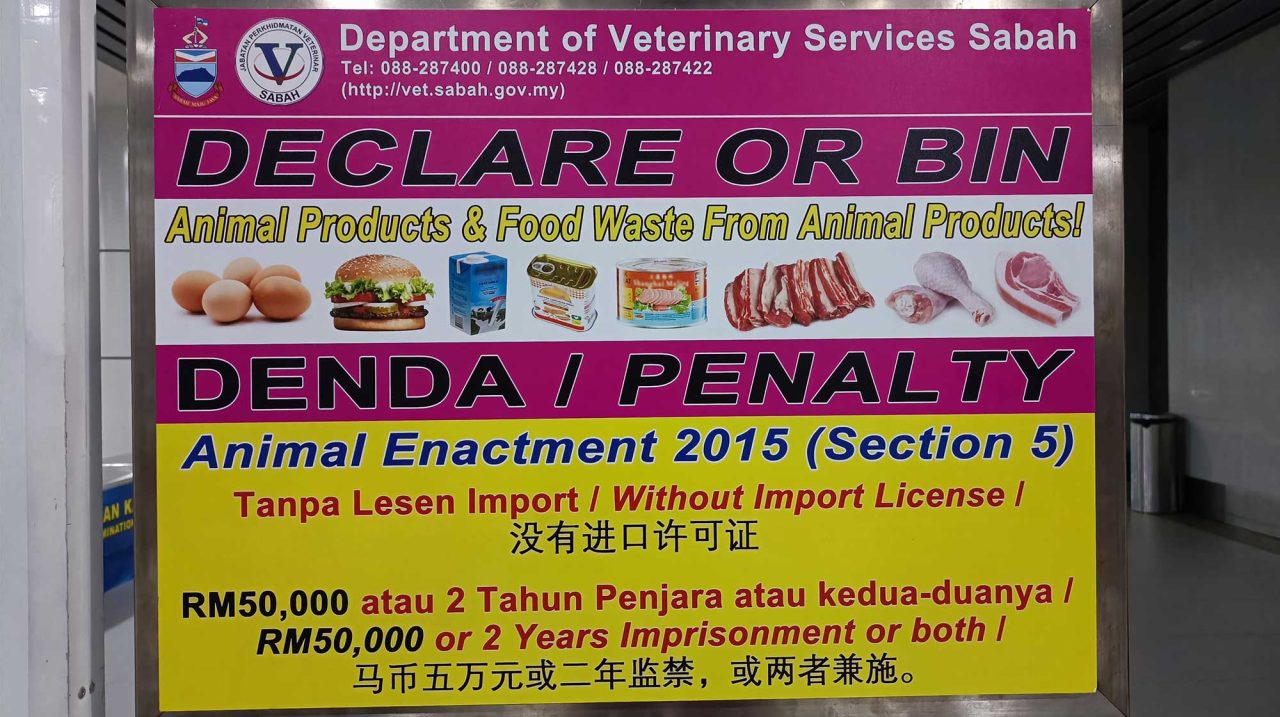
WARNING: Smuggling illicit drugs such as Marijuana, Cocaine and Heroin is a VERY SERIOUS offense in Malaysia and can result in DEATH penalty. Pornography materials and firearm (even the fake one like BB Gun) are prohibited items to bring in.
Fly to Sabah
Sabah has many direct international flight connection to major cities of East Asia and Australia. You can use Google Flights to look for direct flight and bargain tickets to fly to Sabah. If no direct flight to KK, you can fly to other cities (e.g. Kuala Lumpur, Singapore, Brunei, Taipei, Seoul, Tokyo, Hong Kong, Manila) which have direct flight to Sabah. To move around major towns / cities of Sabah, book a domestic flight with Air Asia or MASwings
Kota Kinabalu International Airport (KKIA)
KKIA is the second busiest airport in Malaysia and 7.5 KM away from Kota Kinabalu city. Most international flights to Sabah will land there. Locals and tourists also mainly rely on domestic flight to travel between east and west coast of Sabah.
Once you arrive Sabah, there are a few things you can do in KKIA:
- Get a airport taxi / bus, or call a Grab driver to pick you up
- Exchange a small amount of Malaysian currency.
- Register a local mobile phone line, which includes Internet data plan.
- Visit Tourism Malaysia information booth to get more information about your trip.
- You can even book tour package and accommodation, or rent a car there.

Note: Most businesses there open during normal working hours and some open until 10pm. McDonald’s McCafe in KKIA opens 24×7.
Public Transport
Our public transportation system is a joke. It is inconvenient to move around Sabah without a car. You can get a taxi or (e-Hailing Services) Grab driver easily in city, hotels, shopping malls and popular tourist spots. Though the taxi has the label that says “Teksi Bermeter” (Meter Taxi), they seldom use the meter. Haggle for the price before getting into the taxi. Mobile apps such as Waze, Google Map and Grab will help you a lot.
Renting a Car
Car rental is available in cities of Sabah. You can even book a car online, then collect it at the airport upon your arrival. You need a Malaysia or International Driver License to rent a car. A good place to rent car in Kota Kinabalu is Wisma Sabah.
The rental fee starts from MYR40/day for Motorbike, MYR150/day for Sedan, MYR500/day for 4-wheel Drive and MYR400/day for a Van. In Malaysia we drive at left side of the road (driver seat is at the right). The car should remain on left lane if not overtaking. Driver and passengers must fasten their seat belt or get fined heavily.
Boat Transfer
If you want to visit the islands (Sapi, Manukan, Mamutik, Sepanggar, Mengalum) off Kota Kinabalu city, you can depart from Jesselton Point, Sutera Harbour or Star Marina, which operates between 7am to 4:30pm. Please read my guide about these 3 boat terminals.
To visit islands of Semporna, you can book with travel agent. Most of them sells island-hopping day trip. Island resorts will provide boat transfer if you will stay on their islands. It’s NOT safe to use the unlicensed boat service, they usually wander nearby the terminal (e.g. KK fish market, Wisma Merdeka) and offer you cheaper deals.
Long Distance Bus
There are two long-distance bus terminals in Kota Kinabalu that connects to major cities / towns (e.g. Sandakan, Tawau, Lahad Datu, Semporna, Kudat) of Sabah regularly. The long distance bus is known as Bas Ekpress (Express Bus). Route to one location is usually operated by a few companies and depart in different time from 6:30am to 8:30pm.
- Inanam Bus Terminal (North) (see Location Map): (from KK) to Kundasang / Kinabalu Park (92 KM), Sandakan (332 KM), Semporna (530 KM), Lahad Datu (403 KM), Kunak, Tenom, etc. (Online Ticketing available)
- Padang Merdeka Field (see Location Map): KK to Kota Belud (68 KM), Kudat (179 KM), Kundasang, Ranau, Tambunan, Keningau, Tenom
- KK Sentral (South) (see Location Map): KK to Beaufort, Kuala Penyu, Brunei, Sipitang, Bongawan, Membakut

To save time, you should consider domestic flight over buses. For example, travel from KK to Tawau by bus takes 10 hours but only 45 minutes by flight.
Accommodation
Sabah has over 500 hotels, and with range of choices from 5-star hotels to budget hostels. Nowadays you can book accommodation at attractive rate with feature-rich online booking site like Booking.com and Agoda. You can check the location with interactive map, photo gallery and reviews. AirBnB also offers you some decent choices. Most of them offers pick-up at airport.
However, if you ask for my advice, the following hotels and resorts are my personal recommendation based on reviews by tourists. Please note the prices can vary considerably depend on the (sea) view, room size, package, length of stay, etc. The fee would be higher during peak season such as Chinese New Year. Foreign tourist (non-Malaysian) needs to pay Tourism Tax (or TTx) of MYR10 per room per night for staying in hotels or registered private accommodations.
Recommended Accommodations
5-Star Hotels
Price Range: MYR500-MYR1,870
- Kota Kinabalu: Shangri-La’s Tanjung Aru Resort & Spa (STAR), The Magellan Sutera Resort, Hyatt Regency Kinabalu*, Hotel Le Meridien*, Hilton Kota Kinabalu*, Hyatt Centric Kota Kinabalu*
- Tuaran: Shangri-La’s Rasa Ria Resort & Spa
4-Star Hotels
Price Range: MYR250-MYR560
- Kota Kinabalu: Hotel Grandis*, Mercure Kota Kinabalu City Centre*, Horizon Hotel*, Promenade Hotel*
3-Star Hotels
Price Range: MYR125-MYR350
- Kota Kinabalu: Hotel Sixty3*, Gaya Centre Hotel*, The Jesselton Hotel*, Dreamtel*
*located in City Centre of Kota Kinabalu
Island Resorts
Price Range: MYR950-MYR3,700
- Kota Kinabalu: Gaya Island Resort, Gayana Marine Resort, Bunga Raya Island Resort, Manukan Island
- Semporna: Sipadan Water Village Resort, Sipadan Mabul Resort (SMART), Kapalai Dive Resort, Mataking Island Resort
- Sandakan: Lankayan Resort
If you want something different, go for our homestay or camping. Here are some special accommodation:
- Rungus Longhouse
- Misompuru Homestay
- Glamping on Libaran Island
- Seaventures (Dive Resort)
- Camping at Tegudon Tourism Village
- Farmstay: Kiulu Farmstay, Sabah Tea Garden
Health and Hygiene
- Government hospitals, clinics and pharmacies are available in most towns / cities.
- Treated pipe water is available in most urban and sub-urban areas. Tap water must be boiled before drinking.
- Due to hot weather, you need to prevent dehydration, sunburn, and heat stroke, by applying sunscreen and drink a lot of water.
- You will sweat a lot. Bath every day or you will stink.
- Mosquito is most active during dusk and dawn. Have an insect repellent next to you.
- Sandfly is present near mangrove swamp in evening. Its bite is itchy. Don’t scratch or it will get worse.
- Beware of jellyfish. The sting of box jellyfish can be fatal to child.
- Bacteria that cause food poisoning multiply fast in our warm weather. Eat the food while it is still hot / fresh.
- You always can find Pharmacy / Drug Store such as Watson and Guardian nearby.
- Most public toilet are wet and smelly but bearable. Bring toilet seat wipes if you want extra clean.
- Toilet paper is not provided in most toilet (except your hotels). Bring your own or you can experiment the water “bum gun”.
Things to Bring
- Clothing (for tropical climate): shirts, shorts, jean, pants, skirt, underwear, socks, pajamas, etc.
- Comfortable walking shoes and sandal
- Passport
- Visa (if required)
- Cash Money
- Credit card
- Sunscreen lotion / spray
- Towels
- Sunglasses, Contact Lenses
- Phone, cable, charger & power bank
- Camera, battery and charger
- Travel plug adapter
- Toiletries: toilet paper, tooth brush & paste, soap / body wash, shampoo & conditioner, face wash, hairbrush / comb, razor & shaving cream, dental floss, mouthwash, cotton buds
- Backpack (best if come with rain cover)
- Reusable water bottle
- Personal Medicine & Supplement
- Raincoat / Poncho
- For lady: makeup, lip balm with SPF, moisturiser, facial mask, body lotion, perfume, hair ties and clips, makeup remover, cotton pads, sanitary items
- Optional items for outdoor activities: hiking shoes, insect repellent, swimwear, bikini, rash guard, hat, dry bag, beach towel, walking stick, flashlight, anti-leech socks
- International / Malaysia Driver License (if you rent a car)
- Books? Really?
You don’t need to bring any snorkeling and diving gears, which are available for rent here.
Safety & Advice
- Always book your tour with a licensed travel agent / operator. To check if a tour company is legitimate, you can refer to the member list by MATTA (Malaysian Association of Tour and Travel Agents).
- Be vigilant for flash floods when playing near rivers or waterfalls. Flash floods can occur even on sunny days. Leave the water immediately if you notice it rising rapidly and changing to a darker color.
- Practice COMMON SENSE to avoid becoming an easy target of petty crime such as pickpocket and snatch thief.
- NEVER, EVER leave your bag unattended on car seat.
- Don’t flash your money in public.
- While dining in public places, don’t leave valuable belonging such as phone and handbag on the desk.
- Though some countries issue advisory against travelling in east coast of Sabah, security is good after more garrison are deployed to islands.
- While crossing road, watch out for motorbikes speeding between cars.
- Never trust pedestrian / zebra crossing. Keep an eye on approaching car.
- Only book your tour with licensed travel agents. Illegal tour agents don’t care about your safety and you are not insured.
- Any headhunter? No. Borneo is used to be the land of headhunters, but it’s history.
- Photocopy your National Identity Card, Passport (Photo ID page) and Credit Card, and store them separately
- Look up the contact of your embassy in KK and save it on your phone.
- Drone is forbidden in some islands and restricted zones. Ask before you fly one, and study our regulations.
(Boring) History in Brief
Sabah was part of Brunei in the 16th century. In year 1658, Brunei Sultan (King) ceded the northern and eastern part of Borneo to the Sultan of Sulu (Philippines). By 1881, Sabah was granted to British government and administered by British North Borneo Chartered Company. Sabah became a protectorate of the United Kingdom in 1888 and named as North Borneo (Kota Kinabalu was called Jesselton during that period). Except 1942-1945, under the hand of the Japanese during World War II, Sabah was controlled by the British until Sabah (North Borneo) gained total independence and formed Malaysia with Sarawak, Malaya, and Singapore on 16 September 1963.
Useful Apps
- Grab: e-hailing service, similar to Uber
- WhatsApp: almost every person and company in Sabah use this messaging apps
- Google Maps: to get around and look for restaurants and accommodation
- Waze: very useful navigation apps if you drive on your own. Also work offline.
- Foodpanda: food delivery to deliver local food to you without walking out of your room
- Boost and Alipay: e-Wallet
- Sabah Smart Parking: convenient for those who rent a car and would park frequently in Kota Kinabalu City.
Useful Numbers & Contact
- Kota Kinabalu International Airport (KKIA): +6088325555
- Tourist Information Center (Sabah Tourism Board): +60 88-212121 (E-mail: info@sabahtourism.com)
- Police / Ambulance: 999
- Custom Department (Sabah): +60 88-348100
- Immigration Department (Sabah): +60 88-413657
- Queen Elizabeth Hospital I: +60 88-517555
- Queen Elizabeth Hospital II: +60 88-324600
- List of Consulates / Embassy in Kota Kinabalu City
Thanks for reading this far. Please e-mail me if you find anything incorrect (even a typo) or incomplete. Please note this is not a sponsored page. No company pays me to get recommended here.
